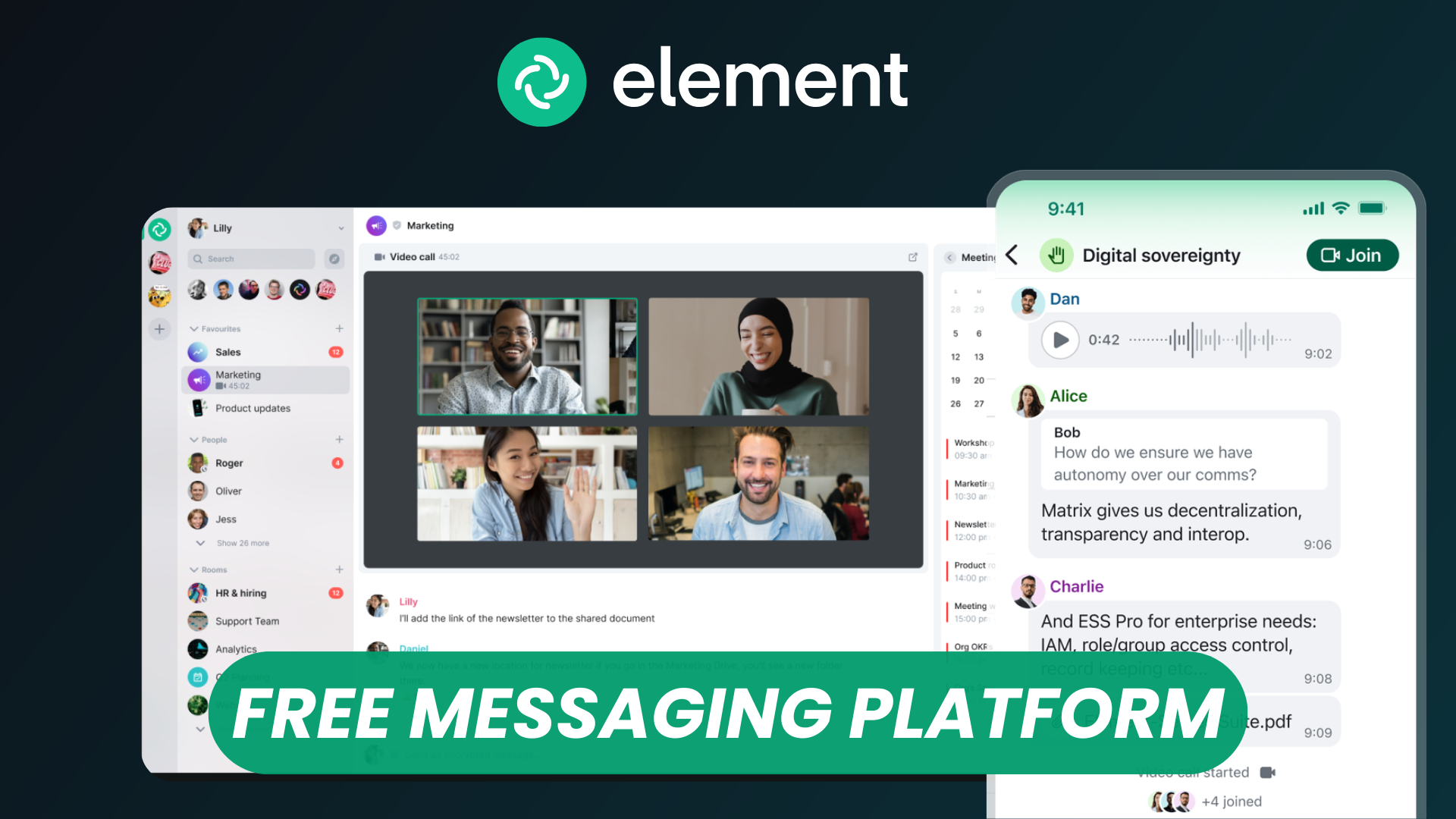Element: The Open Source Alternative to Telegram & Slack

In a world dominated by proprietary messaging apps like Slack, Discord, and Telegram, privacy-conscious users and organizations are increasingly turning to Element — a free, open-source, decentralized communication platform built on the Matrix protocol.
Unlike closed platforms, Element puts users in full control of their data and hosting. It’s ideal for teams, communities, and individuals who value security, transparency, and interoperability. Whether you’re looking for a private company chat solution or a public community space, Element offers a feature-rich experience that rivals the biggest players in the market.
Discover Element features in our platform overview
Onboarding Tour
Getting started with Element is straightforward.
You can create an account on the official Element web app or connect to your own self-hosted Matrix server.
The signup flow allows you to pick your preferred homeserver — giving you the choice to join the main matrix.org instance or host your own for maximum control.
Once logged in, you’ll be greeted with a clean interface that feels familiar to anyone used to chat apps like Slack or Telegram. The left sidebar lists your rooms and spaces, while the main panel displays conversations and threads.
Channel Creation
Creating a new conversation space (called a Room in Element) is simple.
You can create private rooms for team discussions or public channels open to the world. Each room can be configured with granular permissions, from who can post messages to who can invite others.
Rooms support end-to-end encryption (E2EE) by default for private chats, ensuring that only participants can read the content — not even the server administrator.
User Invites
Inviting new members is just as flexible.
You can invite users by their Matrix ID (for example, @username:matrix.org) or by sharing a simple invite link. Thanks to Matrix’s federation system, you’re not limited to your own homeserver — anyone from another Matrix instance can join your room if permissions allow.
This interoperability is one of Element’s biggest strengths, bridging communication across different servers in a decentralized way.
Messaging Features
Element’s chat experience is feature-rich and modern.
- Text Messaging: Support for threads, reactions, and Markdown formatting.
- Emojis & Stickers: Built-in emoji picker and support for custom sticker packs.
- Voice Messages: Record and send short voice notes directly from the chat input.
- Polls: Create quick polls to collect opinions from your group.
- File & Location Sharing: Send images, videos, or even share your live location when using the mobile app.
These features make Element not just a privacy-friendly app, but also a polished, enjoyable platform for daily communication.
Voice & Video Conferences
Element integrates seamlessly with Element Call, a WebRTC-based video and voice conferencing tool built on Matrix.
Users can launch one-on-one calls or group conferences directly inside rooms. Screen sharing, lobby modes, and noise suppression are also supported — making Element a complete replacement for tools like Slack Calls or Zoom.
Private & Public Spaces
One of Element’s standout features is the concept of Spaces — collections of rooms organized under a shared umbrella.
Spaces can be private, used internally by companies or teams, or public, acting as open communities that anyone can explore and join.
Because Element runs on the decentralized Matrix network, you can join channels hosted on other instances — no matter where they’re located. This is like being able to join a Slack workspace or Telegram group hosted by someone else, without needing to sign up for a new account.
Desktop & Mobile Clients
Element offers full-featured apps for desktop (Windows, macOS, Linux) and mobile (iOS, Android), alongside a web version.
The interface and features are consistent across all platforms, with real-time synchronization between devices.
For developers and self-hosters, Element’s open API and active community mean you can customize or even build your own branded client on top of the Matrix protocol.
Conclusion
Element proves that open-source communication can be both secure and user-friendly.
With decentralized hosting, encrypted messaging, and cross-instance interoperability, it’s an ideal alternative to centralized chat platforms like Telegram or Slack.
Whether you’re managing a team, a community, or simply want more control over your digital conversations, Element gives you the freedom to communicate — on your terms.
Deploy your fully managed self-hosted Element instance with Elestio.

